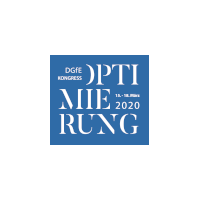OPTIMISATION
27th Congress of the German Educational Research Association
15-18 March 2020 in Cologne
OPTIMISATION is one of the central topics of our time. It determines many areas of society, such as the development of technical infrastructure, the functionality of institutions or the improvement of human performance. At the same time, OPTIMISATION has become an important topos of educational science in a number of conceptual variations, raising a multitude of theoretical and practical questions. These questions concern, for example, the processing of individual and cultural baseline conditions of educational processes, the political and social goals of pedagogical action as well as their means, the further development of the educational system, the use of existing resources or the scientific examination of pedagogical issues.
Both educational theories and practices in the modern age confront different discourses of OPTIMISATION and socially sanctioned OPTIMISATION practices that concern educators and researchers alike. The anticipation of OPTIMISATION affects both pedagogy and educational science and has initiated a process of transformation. On the one hand, this has led to an optimistic idea of a basically unlimited capacity for growth and development (of people, institutions, societies, etc.) based on individual and collective practices. On the other hand, OPTIMISATION is not only a positively underpinned concept established in pedagogical thought and action, but is also being criticised. Some commentators suggest that a one-sided focus on OPTIMISATION could overlook fundamental limits of what is achievable and feasible in pedagogy as well as the possibility of failure and deterioration.
The aforementioned indications show that OPTIMISATION is a relevant topic throughout the educational sciences which extends into many central areas in the various educational institutions and sub-disciplines. It is, among other things,
- an anthropological figure, which resonates in the theoretical concept of perfectibility, or, in economic terms, in the pedagogical debates on human resources and resilience;
- an organisational and institutional practice that describes the extensive and smooth use of available resources to achieve goals, for example the improvement of organisational and structural aspects of work processes with the aim of maximising productive forces or productivity (efficiency and effectiveness through new media, digitisation, transition to flexible learning/mobile learning);
- a didactic strategy aimed at improving or maximising the measurable output of institutionalised teaching and learning processes. This maximisation also concerns the professionalism of the educators themselves. In this context, research-based learning or media-supported learning come to mind;
- an educational research programme that focuses on methodical and methodological improvement in theories and concepts, survey and measurement methods as well as evaluation procedures (cf. evidence-based research, design-based research);
- a matrix for the presentation and evaluation of educational impact assessments and risk research that records and assesses the positive and negative effects of educational measures and developments. This involves the primary and secondary effects of pedagogical improvement initiatives, which can also be generated by second-order observations;
- a guiding formula for educational thought and action which is oriented towards the central goals of modern or late modern societies, such as justice, sustainability, inclusion, independence, progress, etc.
OPTIMISATION as a topos in educational science has not yet been sufficiently discussed. It presents an abundance of inherent tensions and problems, which are often unquestioned and implicitly taken into account. It is a term which seems to be established in the mainstream of pedagogical thought and action, but which also triggers fierce controversies as a term of criticism. But without an examination of the idea of OPTIMISATION in the field of education, a modern educational science cannot be conceptualized.
The DGfE-Congress in Cologne
OPTIMISATION is an ambiguous and exciting topos charged with different, sometimes contradictory and ambivalent meanings. The congress will address these various dimensions and facets of OPTIMISATION in the context of the different sectional approaches in the German Educational Research Association (DGfE) and explore their significance for educational science as a discipline and for all relevant pedagogical questions. Pedagogical practice and educational science are influenced by other functional systems (economics, politics, medicine, media, etc.); therefore, the Cologne Congress will focus on the influence of educators in research and practice on social and cultural OPTIMISATION processes.
